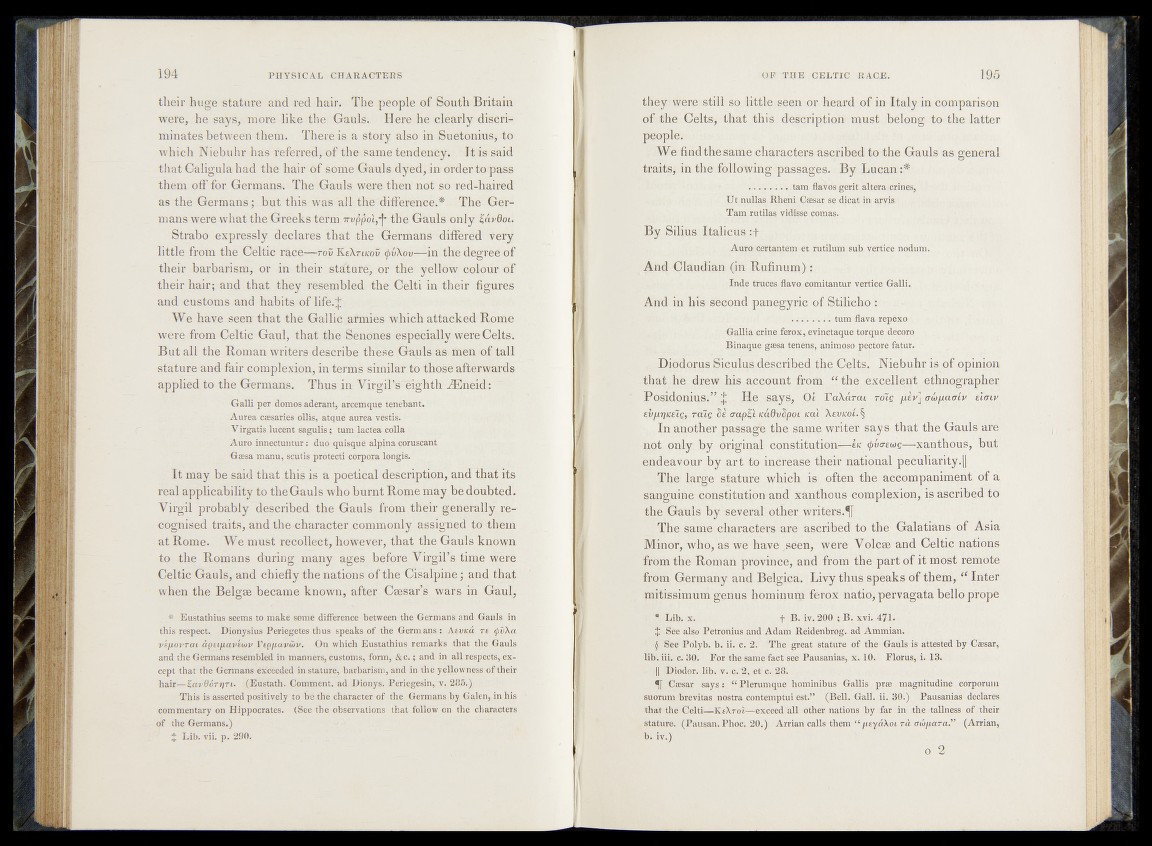
their huge stature and red hair. The people of South Britain
were, he says,N more like tbefGanls. Here he cleariy*diseri-
minates between them. There-is a story; also'in Sueftbnimj to
which Niebuhr has referred, of the same tendency. 11 is said
that Galigula had th e hair df some.Gauls dyed,jn'©rder to pass
them off for Germans. The--Gauls were, then n o t so red-haired
as the Germans; but this was all the diffeifence.* The Germans
were what the Greeks term the-Gauls only ZavBou
Strabo .expressly declares th a t th e Germans 'differed tery
little from the Celtic race—row KeKtikov.fyvk'oit^—in'the degree of
their -ba?barisin*; or in their stdture) or the: yellow ooloiir^of
their-hair; and that they resembled the.Celti in theiri figures
and customs and habits of life.;^;.
We have seeirthat the Gallic afmies which attacked Rome
were from Celtic Gaul, that the Sencfnes especially were Celts.
But all the. Roman writers descrilib'the&e Gapjs as. men of tall
stature and fair complexion, in terms similar to those'afterwards
applied to the Germans. Thus in Virgil’s ^ ^ h th .ZEneids 'tT,
' Galli per domos aderant, arcemqup tenebant. -
Aurea cassaries ollis, atque aurea vestiss f .
Virgatis lucent sagulis; turn lactea colla .
Anro innectuntur: duo quisqtfe alpina coruscant
Gsesa manu, scutis proteeti corpora longis. - w
I t may be said that thisjs a poeticalidescriptidn, and that its
real applicability to the Gauls who burnt Rome mayjae doubted.
Virgil probably described the Gauls from their generally re-
cognised traits, and the -character,comm only assigned td%hem
a t Rome,, ..’ We must recolleet, however, that the Gauls known
to the Romans during many ages^ before Virgil’s time were
Celtic Gauls, and chiefly the nations of the Cisalpine; and that
when the Belgae became known, after Caesar’s wars in Gaul,
*- Eustathius seems to make some difference between the Germans and Gauls in
this respect. Dionysius Periegetes thus speaks of the Germans : . Asu/cd r e $ y \ a
v i f i o v r a i a p a f ia v e w v F fp fia v& v . On which Eustathius remarks that the Gauls
and- the Germans resembled in manners, customs, form, &c.; and in all respects, except
that the Germans exceeded in stature, barbarism, and ih the yellowness of their
hair—f a v& d r r ir t. (Eustath. Comment, ad Dionys. Periegesin, v. 285.) -
This is asserted positively to be the character of the,Germans by Galen, in his
-commentary on Hippocrates. (See the observations that follow on the characters
of the Germans.)
I j Eib. viL p. 290.
they! were still so little.seen or heard of in Italy in comparison
of: the. Celts-, that this.description must belong to the latter
people;-.
We find thesame-characters, aspribed to the Gauls as general
traits, in the' followingipas-sages. By Lucan;#
flavos gerit altera crines,
/ Ut nulla® Rheni Csesar se dicat in arvis
Tam rixtilas vidisse comas.
By Siljus Italicus
Auro oertantem et rutilum sub vertice nodum. ,
And Olaudian (in Rufiaum;}*:/; ;
■ Ipde truces ffevQ.,,Gpmitantiir vertice Galli.
And in his second panegyric /of Sfilicho :
..turn flava repejEo.i ?
Gallia crine ferox, .evinctaque torque decora .
_ Binaque gsesa tenens, animoso pectore fatur. -
, DipH orps, SicH/lu^.d,escribe4tthe^elts,L Niebuhr is of .opinion
that he drew his account from “ the excellent ethnographer
POsidonips,’VJ Hei:^yS, - ^ J , .X : a X ^ r ^ i fMv'j GhifJtaqiv elaiv
ejbfirietT£jiTgl&£e&ap&. Kady^oX kcu -
^ , In [another pgissagh, the .shpae write?: says that the Gauls'are
not only,by original constitution— we—xanthbOs', but
'enda^our by ajvt to increase their‘Rational peculiarity .IP,
*The ljtTge stature which isv often the accompaniment of a
sanguine, .constitution and' xanthdus complexion,; is ascribed to
the’Gauls by several other writers,^' t
The same characters are ascfibedPto the G|alatians of Asia
Minor).’who, as we have ,seen, were, V b 1 |^ and Celtic nations
from the Roman-proyihcd/.and from thp-^ralbdf it most remote
from Germany and Belgica. Livy thus speaks of them, “ Inter
mitissimum genus hominuip ferox natio., pervagata bell’o prope
* 'Lib. -x. f.B .,i^ '2 0 0 ;B . xvi.,471.
J -See also Fetronius and'Adam Readenbrpg. ad Ammian.
Sse Polyb. bfiiPcs 2. The great stature of thE Gauls is attested by Caesar,
lib. iii.- c.; 30. Eor the same fact see Pausanias, x . 10. Elorus$;i. 13. ' <
C%[| fpiodor. libs V*1q.,”2 i, iet' c.j 28,,,, •,
ff. Cffisar sftys^^Herumque ,homii®aS"jGa'llis ,-prae magnitudine corporuui
suorum brevitas nostra contemptui est.” f (Bell. 'Galt ii.^ 0 .) Pausanias
that the^Gelti^-keAfo^eXceedfalb other nations by far in-.the tallness of their
stature. (Pausan. Phoc. 20.) Arrian calls them “ fie y a X o i t A a u t/ia ra .'” (Arrian,
;b.
o 2